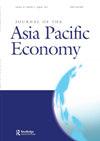The disproportionate effect of COVID-19 on the labour market in South Korea
IF 1.5
4区 经济学
Q3 ECONOMICS
引用次数: 0
Abstract
COVID-19 delivered distributional effects on the labour market. Therefore, policymakers concentrated on designing more efficient and effective fiscal supports to alleviate economic damages. To draw more specific pictures, this study estimates who faced harder impacts and how much they experienced economic difficulties in Korea using unconditional quantile regression and separating vulnerable sectors, such as face-to-face industries. The findings suggest that self-employed workers in the vulnerable industries at low-income percentiles presented the most severe damages. Second, self-employed workers in other sectors, temporary workers in the vulnerable industries, and low-income households also had serious impacts. Third, female workers, who have a primary child-care duty, experienced serious negative effects due to the regulation disparity between strict school closure measures and generous workplace restrictions. In this regard, financial supports should aim to target more damaged groups instead of universal benefits. Furthermore, it is also important to improve child-care services to mitigate gender inequality.COVID-19对韩国劳动力市场的不成比例的影响
新冠肺炎对劳动力市场产生了分配效应。因此,政策制定者集中精力设计更高效、更有效的财政支持,以减轻经济损失。为了描绘更具体的画面,这项研究使用无条件分位数回归和分离弱势行业(如面对面行业)来估计谁在韩国面临更大的影响以及他们经历了多少经济困难。研究结果表明,处于低收入百分位数的弱势行业的自营职业者受到的损害最为严重。其次,其他部门的自营职业者、弱势行业的临时工和低收入家庭也受到了严重影响。第三,由于严格的学校关闭措施和宽松的工作场所限制之间的监管差异,负有主要儿童保育职责的女性工人经历了严重的负面影响。在这方面,财政支持应旨在针对更多受损群体,而不是普遍福利。此外,改善儿童保育服务以缓解性别不平等也很重要。
本文章由计算机程序翻译,如有差异,请以英文原文为准。
求助全文
约1分钟内获得全文
求助全文
来源期刊

Journal of the Asia Pacific Economy
ECONOMICS-
CiteScore
3.70
自引率
7.10%
发文量
58
期刊介绍:
Journal of the Asia Pacific Economy (JAPE) is concerned primarily with the developing economies within Pacific Asia and South Asia. It aims to promote greater understanding of the complex factors that have influenced and continue to shape the transformation of the diverse economies in this region. Studies on developed countries will be considered only if they have implications for the developing countries in the region. The journal''s editorial policy is to maintain a sound balance between theoretical and empirical studies. JAPE publishes research papers in economics but also welcomes papers that deal with economic issues using a multi-disciplinary approach. Submissions may range from overviews spanning the region or parts of it, to papers with a detailed focus on particular issues facing individual countries. JAPE has a broad readership, which makes papers concerned with narrow and detailed technical matters inappropriate for inclusion. In addition, papers should not be simply one more application of a formal model or statistical technique used elsewhere. Authors should note that discussion of results must make sense intuitively, and relate to the institutional and historical context of the geographic area analyzed. We particularly ask authors to spell out the practical policy implications of their findings for governments and business. In addition to articles, JAPE publishes short notes, comments and book reviews. From time to time, it also publishes special issues on matters of great importance to economies in the Asia Pacific area.
 求助内容:
求助内容: 应助结果提醒方式:
应助结果提醒方式:


